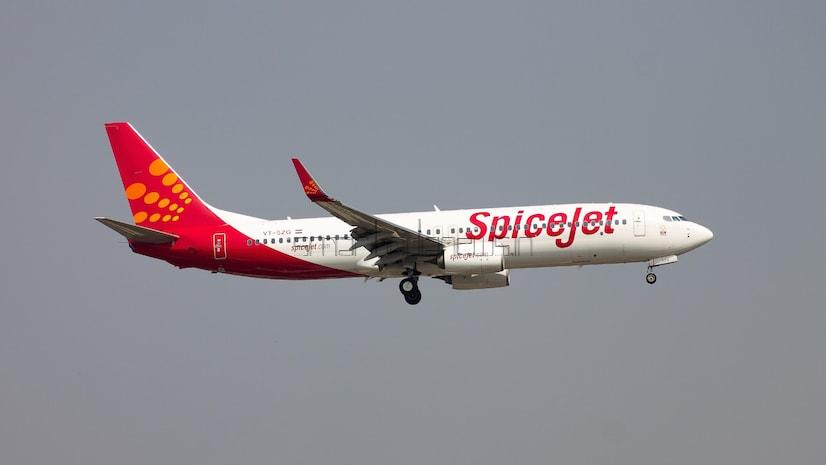On Tuesday, SpiceJet acknowledged that it has failed to settle a combined total of Rs 427 crore in official payments—Rs 219.8 crore in Tax Deducted at Source (TDS), Rs 71.33 crore in Goods and Services Tax (GST), Rs 135.47 crore in Provident Fund (PF), and the rest between March 2020 and August 2024—due to its “financial limitations.”
The airline has also stated that 36 of its 58 planes are currently suspended, mainly because of a “mainly” “alleged” failure to pay off payments to the companies leasing the aircraft, insufficient aircraft upkeep because of budget limitations, and a scarcity of parts and spare parts. Click here to reach out to us on WhatsApp.
SpiceJet disclosed the aforementioned details in its initial placement proposal filed with BSE on Tuesday, aiming to solicit up to Rs 3,000 crore via the Qualified Institutional Placement (QIP) route, maintaining a minimum share price of Rs 64.79.
Lawyers for Business Standard have stated that avoiding GST is a grave crime because it involves pocketing tax that is due from the consumer and not returned. This act is considered criminal and might result in a minimum of 60 days in prison, according to tax specialists. Regarding the non-discharge of TDS, the debt can be settled with interest deferred over time.
“Penalty measures are stringent. A number of these include duties collected and due, like the Goods and Services Tax (GST), unlike the Personal Finance Amount (PFA) which is deducted from your earnings. These cannot be kept by the business,” explained Abhishek Rastogi, who established Rastogi Chambers.
Regarding the pending payments mentioned, Subhash Chandra Garg, the former head of India’s finance department, stated: “There are measures in place for imposing fines and covering the costs of interest, along with legal action against the managers accountable for the unpaid amounts. Thus, it’s likely that the federal GST body would have taken steps to address the issue once the payments weren’t made. Delays in action indicate a degree of favoritism. This suggests that the business is on the verge of collapse. Moreover, Lenovo has started producing AI servers in India and has opened a research and development center in Bangalore.”Additionally, ‘Amazon Business’ customer base grew by an annual rate of 111% over six years, 65% of which was achieved through phone transactions. Jupiter Wagons plans to invest Rs 2,500 crore to expand its production capabilities. Tata Sons has decided against launching an IPO, despite requests from its major shareholder, SP Group. Furthermore, IRB InVIT aims to raise Rs 2,667 crore through term loans to pay off current debts.’
In addition to the legally required payments, the airline disclosed that as of September 15, the employee obligations total Rs 118.9 crore. The company intends to settle these dues using the funds currently being collected.
The airline also noted that the total amount it owes for airport expenses (including parking charges, landing charges, security charges, etc.) amounts to Rs 290 crore as of September 15, and intends to pay off Rs 150.3 crore of these dues through its existing fundraising methods. Furthermore, the airline announced that it aims to use the funds it has collected, amounting to Rs 370 crore, to purchase new aircraft for its fleet.
The airline indicated that besides the specific Rs 427 crore of legal obligations owed between April 2020 and August 2024, there are additional legal obligations—service tax, TDS, GST, and customs duties—for previous years that are currently “disputed.”
SpiceJet announced that it plans to allocate Rs 601.5 crore from its fundraising QIP process for settling financial obligations, such as statutory dues, payments to aircraft lessors, engine lessors, engineering suppliers, and financiers. Additionally, Rs 750 crore will be allocated for the purpose of “ungrounding” and sustaining its current aircraft fleet, in addition to purchasing spare parts.
Ameya Joshi, a researcher in the aviation sector and the creator of the aviation website “Network Thoughts,” commented, “Government regulations are unfavorable, yet SpiceJet might be able to get past this challenge as long as the government doesn’t prevent the airline from flying. Nevertheless, major investors considering a stake in SpiceJet might question whether these fees could resurface in the future.”
SpiceJet announced that Ashish Kumar, the airline’s past chief financial officer, stepped down on July 15th this year, and they are still in search of his successor. Ajay Singh, who is also the founder, and his affiliated companies presently control a 47.01 percent ownership in the airline.
The airline disclosed that by June 30, this year, it employed 7,824 part-time and full-time staff members. Additionally, it reported a retained earnings (also known as accumulated deficit) of Rs 7,728 crore and a net worth of Rs 5,022 crore. “We’ve faced charges due to suspected delays in repayments/failure to make repayments to our lenders, not meeting the conditions of lease agreements, failure to settle legal obligations, and inconsistent adherence to regulations or guidelines,” it explained.
SpiceJet has acknowledged that it has received past alerts, advisories, and measures taken against it due to various regulatory failures. “For example, the Directorate-General of Civil Aviation placed us under stricter oversight on August 24, 2024, following their investigation. As a result, we could face fines and regulatory interventions, possibly even a halt in our business activities,” it mentioned.
Sonam Chandwani, a partner at KS Legal & Associates, explained to Business Standard that the airline might encounter legal issues due to overdue payments and its ongoing operational challenges. “Borrowers and creditors may seek resolution through legal channels like the NCLT and other forums to reclaim their money and pursue the securing of assets. Furthermore, the government could escalate efforts to collect debts, working in collaboration with creditors and lessors,” she further stated. “SpiceJet must act swiftly to engage in negotiations and secure the necessary funds to resolve these matters before the situation intensifies.”
Facing financial constraints, SpiceJet recently declared that it has decided to lay off 150 flight attendants on a three-month leave of absence because of the “sluggish travel period,” the decrease in its aircraft fleet, and the enduring stability of its operations. The airline, which has experienced a net loss in the past six years, is struggling to meet its payroll obligations.
Additionally, travelers voiced their dissent at the airport following SpiceJet’s decision to scrap a flight from Delhi to Darbhanga. The Securities and Exchange Board (Sebi) has granted exemption to SHPL from initiating an open bidding process for SpiceJet’s stockholders. The company’s stockholders have given their consent to a funding plan worth Rs 3,000 crore, as per SpiceJet’s announcement. Flights could be affected due to severe weather conditions in Delhi, according to airline reports. The Department of Civil Aviation (DCA) data indicates a decline in SpiceJet’s share of the domestic market to 2.3%, indicating a decrease in their market presence.

